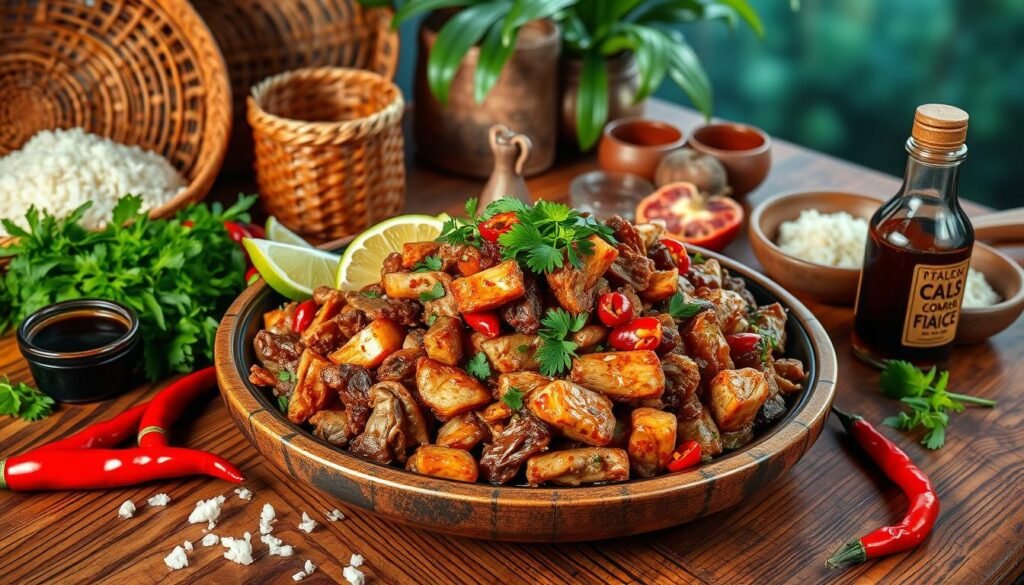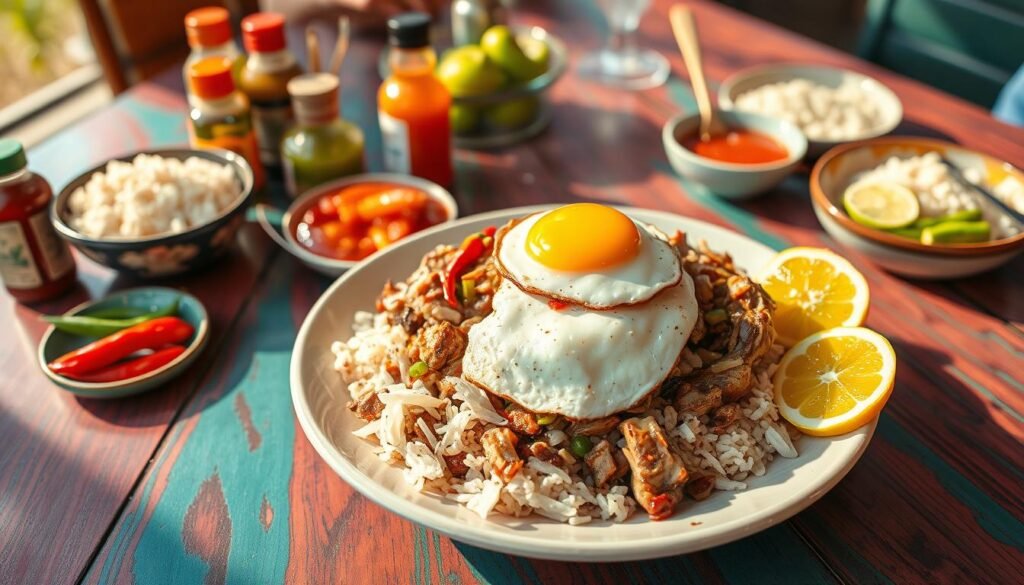What makes sisig, a traditional Filipino food, so captivating? It has become a key part of the country’s cuisine. Sisig is known as one of the most iconic dishes in the Philippines. Its popularity has grown nationwide, with variations in nearly every city and town.
According to Anthony Bourdain, sisig is “everything I love about food.” This highlights its significance in Filipino cuisine. The dish has gained international attention. It is now served in restaurants in the United States, Canada, and beyond.
Sisig has become a beloved Filipino dish. It is a staple in Filipino restaurants. It is often served at parties, fiestas, and even fine dining establishments.
With its unique flavor and cultural significance, sisig has become an obsession. It is a significant part of the country’s food scene. It represents the country’s rich culinary culture.
Key Takeaways
- Sisig is a traditional Filipino dish that has gained international attention
- It is known for its unique flavor and cultural significance in Filipino cuisine
- Sisig is often served at parties, fiestas, and fine dining establishments
- The dish typically consists of pork, including pig’s cheeks, ears, and sometimes the brain
- Sisig is a staple in Filipino restaurants and a representation of the country’s rich culinary culture
- Its popularity has grown nationwide, with variations available in nearly every city and town
What is Sisig?
Sisig is a traditional Filipino dish from Pampanga. It’s made with pork, vinegar, chili peppers, and onions. These ingredients have been used for generations, making sisig a key part of Filipino food.
The dish has a long history, starting in the Spanish colonial period. Over time, different versions of sisig have appeared. Some use chicken or seafood, while others add special spices.
A Brief History of the Dish
Lucia Cunanan, known as Aling Lucing, created sisig in 1974. She made Angeles, Pampanga famous for sisig. Now, sisig is loved across the Philippines and enjoyed at many gatherings.
Traditional Ingredients
Traditional sisig includes pork, vinegar, chili peppers, and onions. The pork is boiled, broiled, and then grilled. It’s served on a sizzling plate with calamansi and chili peppers.
Regional Variations
There are many sisig variations, each with its own flavor. You can find pork sisig, chicken sisig, and seafood sisig. These options make sisig a rich and varied dish.
The Sizzling Experience
Eating sisig is a unique and exciting part of Filipino cuisine. This popular dish is served on a sizzling plate. This method creates a crispy texture and caramelized flavor, making it unforgettable.
Sisig is a beloved dish in the Philippines. It brings people together with its mix of flavors and textures. It’s often served at celebrations and gatherings, making it a part of Filipino culture.
Cooking Techniques
Cooking techniques like grilling or frying make sisig crispy and flavorful. Ingredients like coconut vinegar, soy sauce, and butter add depth. These techniques and ingredients make sisig a mouth-watering dish that highlights Filipino cuisine.

Serving Styles
Serving sisig with calamansi or steamed rice enhances the experience. The sizzling plate adds drama to the presentation. Whether at a restaurant or a family gathering, sisig impresses and delights everyone.
Key Ingredients That Make Sisig Special
Sisig is a beloved Filipino dish known for its unique taste and texture. It mainly uses pork, like pork belly slices, marinated in a mix of ingredients. These include vinegar, soy sauce, and fish sauce.
The marinade, with 2 smashed garlic cloves and 1 stalk of lemongrass, adds a rich flavor. After marinating, the pork is grilled and broiled to get a crispy texture. The spices and seasonings, like birds eye chili, boost the dish’s flavor and aroma.
The mix of these ingredients and spices makes sisig unforgettable. It’s a key dish in Filipino cuisine, often enjoyed with a cold beer. It’s also garnished with green onions and a red onion.
Pork and Other Meats
While pork is the top choice for sisig, chicken or beef can also be used. The meat choice depends on personal taste, but pork belly slices are the traditional favorite.
Exotic Additions
Some sisig recipes include liver or intestines for a unique taste and texture. These additions are optional but can make the dish even more special.
Spices and Seasonings
The spices and seasonings in sisig, like vinegar, chili peppers, and garlic, are key to its flavor. Finding the right balance of these ingredients is vital for a true sisig experience.
Popular Sisig Variations
Sisig, a beloved Filipino dish, has grown to include many popular variations. These variations cater to different tastes and dietary needs. They make sisig more appealing to a broader audience, keeping its unique flavor and cultural importance.
Some famous sisig types are chicken sisig, tuna sisig, and vegetarian sisig. Chicken sisig uses chicken liver and intestines. Tuna sisig uses canned tuna. Vegetarian sisig, made with tofu or tempeh, is for those who don’t eat meat.
These popular versions are tasty and show the creativity of Filipino cooking. Whether you love meat or prefer plants, there’s a sisig for everyone.

- Chicken sisig is a popular variation that uses chicken liver and intestines.
- Tuna sisig is a seafood-based variation that uses canned tuna.
- Vegetarian sisig is a plant-based variation that uses tofu or tempeh as a protein source.
These variations highlight the diversity and richness of Filipino cuisine. They keep evolving, adapting to new tastes and preferences.
| Variation | Ingredients | Description |
|---|---|---|
| Chicken Sisig | Chicken liver, intestines, onions, salt, pepper | A popular variation that uses chicken liver and intestines. |
| Tuna Sisig | Canned tuna, onions, salt, pepper | A seafood-based variation that uses canned tuna. |
| Vegetarian Sisig | Tofu, tempeh, onions, salt, pepper | A plant-based variation that uses tofu or tempeh as a protein source. |
Nutritional Aspects of Sisig
Sisig is often seen as a high-calorie dish, but it also has many benefits. The number of calories in sisig can change based on the ingredients and how it’s cooked. One serving of sisig (892g) has 437.6 calories, with 31.5 calories from fat.
A breakdown of the nutritional content of sisig is as follows:
| Nutrient | Amount per serving |
|---|---|
| Calories | 437.6 |
| Carbohydrates | 96.7g |
| Protein | 11g |
| Fat | 3.5g |
| Saturated fat | 0.9g |
| Vitamin C | 605.3 mg |
| Manganese | 2.3 mg |
In terms of nutrition, sisig is rich in Vitamin C and Manganese. It has 68.6% of nutritional value per calorie. To burn sisig calories, you could do 146 minutes of yoga, 58 minutes of jogging, or 109 minutes of cleaning. Sisig can be part of a balanced diet when eaten in moderation, providing several benefits for health and well-being.

Sisig in Filipino Celebrations
Sisig is a big part of Filipino celebrations. It’s a favorite at birthdays, weddings, and holidays. It’s more than food; it’s a sign of welcome and warmth.
In these celebrations, sisig is a main dish. It’s served with other Filipino foods. This shows how important sisig is in Filipino culture.
There are many ways sisig is enjoyed during celebrations. Some favorites include:
- Pork sisig with egg
- Chicken sisig with liver
- Vegetarian sisig with tofu
These variations show the diversity of Filipino celebrations. Sisig brings everyone together, whether it’s a big festival or a small family gathering. It’s a sign of the country’s love for food and company.

In conclusion, sisig is key to Filipino celebrations and culture. It shows the country’s rich heritage and traditions. Sisig has changed over time, but its importance in celebrations remains the same. It’s a beloved dish in the Philippines.
| Traditional Sisig Ingredients | Modern Sisig Variations |
|---|---|
| Pork ears/cheeks, chicken liver | Pork sisig with egg, chicken sisig with liver |
| Calamansi, onions, chili peppers | Vegetarian sisig with tofu, sisig with crispy pork |
Where to Find the Best Sisig
If you’re looking for real sisig, you have many choices. Top spots in Manila, like Bonifacio Global City or Makati, have lots of sisig types. Places like Pampanga or Cebu offer unique, authentic sisig experiences.
Some top places for sisig are Aling Lucing’s Sisig, Jun Jun’s Restaurant, and Mila’s Sizzling Sisig. They have different sisig dishes, like pork, chicken, and seafood. You can also try sisig from food trucks and street vendors for a quick, tasty meal.
Top Restaurants in Manila
- Aling Lucing’s Sisig: known for their traditional sisig recipe
- Jun Jun’s Restaurant: offers a variety of sisig dishes, including pork and chicken options
- Mila’s Sizzling Sisig: serves a range of sisig dishes, including seafood options
Exploring different restaurants and food trucks is key to finding the best sisig. Whether you want traditional sisig or something new, there’s a place for you. So, why not try sisig today and taste the Philippines’ delicious flavors?

Regional Favorites
Places like Pampanga or Cebu offer unique, authentic sisig experiences. They have their own special twists and flavors. Some popular dishes include:
- Pampanga-style sisig: known for its spicy and sour flavors
- Cebu-style sisig: features a mix of pork, chicken, and seafood
These regional favorites are worth trying. You can find them at various restaurants and food trucks across the Philippines.
Food Trucks and Street Vendors
Food trucks and street vendors are also great for sisig. They offer a quick, affordable way to enjoy sisig. You can find a variety of dishes, from traditional to unique. Some popular ones include:
- Sisig Food Truck: serves a range of sisig dishes, including pork and chicken options
- Street Sisig: offers a variety of sisig dishes, including seafood options
These vendors are a fantastic way to try sisig. You can find them at many spots across the Philippines.
| Restaurant | Location | Sisig Options |
|---|---|---|
| Aling Lucing’s Sisig | Manila | Traditional sisig, pork sisig, chicken sisig |
| Jun Jun’s Restaurant | Manila | Pork sisig, chicken sisig, seafood sisig |
| Mila’s Sizzling Sisig | Manila | Traditional sisig, pork sisig, chicken sisig, seafood sisig |
The Role of Sisig in Filipino Identity
Sisig is a beloved Filipino dish that holds a special place in identity and culture. It’s a symbol of Filipino cuisine, known for its unique taste and cooking method. Reports show that sisig is more than food; it’s a key part of Filipino heritage.
The way sisig is made and served shows its cultural importance. It’s served sizzling, with a mix of flavors and textures. Sisig has become a source of national pride, celebrated worldwide. Variations like sisig babi, sisig pusung saging, and sisig talaba highlight the dish’s diversity.
- Sisig babi
- Sisig pusung saging
- Sisig talaba
Anthony Bourdain once called sisig “everything I love about food.” He praised its sizzling pork and rich, crispy texture, perfect with beer.

In summary, sisig is more than a dish; it’s a symbol of Filipino identity and culture. Its unique taste and cooking style have made it a favorite in the Philippines and globally.
| Dish | Ingredients | Origin |
|---|---|---|
| Sisig | Pig’s head and liver | Philippines |
| Sisig babi | Pork | Philippines |
| Sisig pusung saging | Banana blossoms | Philippines |
Sisig’s Influence Beyond the Philippines
Sisig has become a hit around the world. Its unique taste and cooking style have inspired many new dishes. It’s now a part of international cuisine, with its influence seen in many global versions.
The global love for sisig is clear in restaurants outside the Philippines. Filipino restaurants in places like the United States are very popular. They offer a taste of home for Filipinos abroad and introduce sisig to more people.
Some notable examples of sisig’s influence include:
- Its declaration as an “intangible heritage” of Angeles City in metro Pampanga
- The celebration of the “Sisig Festival” in Angeles City, which started in 2003
- The evolution of sisig recipes to include various ingredients such as green mussels, lechon, and seafood
The influence of sisig is also seen in how it’s enjoyed with different drinks. For example, it’s often paired with cold beer or calamansi juice. This shows how Filipino dining customs are shared around the world.

In conclusion, sisig’s influence beyond the Philippines shows its unique flavor and cooking style. Its global appeal and adaptation to different cultures have made it a favorite dish worldwide.
| Country | Popularity of Sisig |
|---|---|
| United States | High |
| Australia | Medium |
| Philippines | Very High |
Popular Drinks to Pair with Sisig
Enjoying sisig, a popular Filipino dish, is better with the right drinks. In the Philippines, sisig is often matched with different drinks. Experts say the right pairings make sisig even more enjoyable.
Beer and cocktails are top choices for sisig. A cold San Miguel beer pairs well with sisig. A sisig-inspired cocktail adds a special touch. Calamansi juice or buko juice also offer a refreshing pairing. For more on Filipino food and drinks, check out boozy.ph.
Here are some popular drinks to pair with sisig:
- Beer: San Miguel, Red Horse
- Cocktails: Sisig-inspired cocktail, Calamansi cocktail
- Traditional beverages: Calamansi juice, Buko juice

In summary, the right drinks can make sisig even better. Whether you like beer, cocktails, or traditional drinks, there’s a perfect match for your sisig.
How to Make Authentic Sisig at Home
To make real sisig at home, you need the right cooking tools and ingredients. A sizzling plate or grill is key for the right texture and taste. You can find a detailed recipe online or in a Filipino cookbook to help you.
Important ingredients for sisig include pork belly, pig face maskara, chicken liver, onions, and lady’s choice mayonnaise. Add onion powder, ground black pepper, and chili flakes for extra flavor. Knorr liquid seasoning is also a favorite in many Filipino recipes, including sisig.

To get better at making sisig, follow a tested recipe and use fresh ingredients. Try different sisig variations like chicken or tuna to suit different tastes. For more on Filipino cuisine and cooking, check out this website and discover the Philippines’ rich culture.
Essential Cooking Tools
- Sizzling plate or grill
- Cutting board and knife
- Measuring cups and spoons
Step-by-Step Recipe
Follow a simple recipe to make tasty sisig at home. Begin by preparing the ingredients. Then, cook the pork belly and pig face maskara until they’re crispy. Chop the ingredients into small pieces and mix with mayonnaise, onion powder, and seasonings. Serve the sisig hot, topped with chopped onions and chili peppers.
Sisig in Popular Media
Sisig has become well-known in TV shows, movies, food blogs, and social media. It’s featured in culinary programs, showing off its unique taste and cultural value. This has made sisig a key part of Filipino food, with many fans and food lovers sharing their own versions online.
Food bloggers say sisig has changed over time, with new ingredients and cooking methods. Chicken, beef, and tofu sisig are among the most loved variations. These new takes have made sisig even more popular in Filipino restaurants and homes.
The media has helped make sisig famous, with it being a main part of many stories. Food blogs and social media have also boosted its popularity. Now, sisig is loved not just in the Philippines but worldwide.

What makes sisig so popular in media? Its unique taste and cultural importance are key. It’s been showcased in cooking shows, highlighting its rich history and cultural value. Social media has also played a big role, with people sharing their own sisig recipes and experiences.
Here are some ways sisig has appeared in popular media:
- TV shows and movies: Sisig has been featured in various TV shows and movies, including cooking programs and food documentaries.
- Food blogs: Many food bloggers have written about sisig, sharing their own recipes and cooking techniques.
- Social media: Sisig has become a popular topic on social media, with many enthusiasts sharing their own creations and discoveries.
| Dish | Ingredients | Popularity |
|---|---|---|
| Sisig | Pork, chicken, beef, tofu | High |
| Chicken Sisig | Chicken, onions, calamansi juice | Medium |
| Beef Sisig | Beef, onions, soy sauce | Low |
Sisig and Sustainability
Sisig, a beloved Filipino dish, has grown to include many ingredients and ways of cooking. Its production and consumption affect the environment. To support ethics in food, we must think about where ingredients come from and how sisig is made.
Records show sisig started in the 17th century and is now a key part of Filipino food. To keep sisig sustainable, we need to use eco-friendly methods. This includes cutting down on waste and choosing local ingredients. Supporting local farmers and valuing ethics in food helps make our food system better.
Here are some ways to make sisig more eco-friendly:
- Use local ingredients like pork or veggies to cut down on emissions from transport.
- Choose cooking methods like grilling or steaming to save energy.
- Use every part of ingredients, like pig’s ears or liver, to make a tasty and green dish.
By following these steps, we can enjoy sisig while being kind to the planet. As we keep making sisig better, we must think about how it affects the environment and our community. For more on sustainability in food, check out local food blogs and see what farmers and chefs are doing to help.

The Future of Sisig
Sisig is winning over the hearts and taste buds of Filipinos. Its future looks bright, filled with new and exciting possibilities. The culinary scene in the Philippines is always changing, and sisig is ready to grow with it.
Trends in Filipino Cuisine
More people are interested in eating sustainably and plant-based. Chefs and home cooks are making sisig with mushrooms or jackfruit. They’re also using organic, local ingredients to meet changing tastes.
Gourmet Sisig Innovations
Chefs and home cooks are getting creative with sisig. They’re mixing it with international flavors and using top-notch ingredients. This means we can look forward to a world of new, delicious sisig dishes.
FAQ
What is sisig?
Sisig is a favorite Filipino dish loved around the world. It comes from Pampanga and mixes pork, vinegar, chili peppers, and onions. This mix creates a tasty and spicy dish.
What are the key ingredients in sisig?
Sisig’s main ingredient is pork. Other meats like chicken or beef can also be used. But pork is the most common choice.
Exotic parts like liver or intestines add a special flavor and texture. Spices and seasonings like vinegar, chili peppers, and garlic make sisig even more flavorful.
What are some popular variations of sisig?
Sisig has many variations to suit different tastes. Chicken sisig uses chicken liver and intestines. Tuna sisig uses canned tuna. Vegetarian sisig uses tofu or tempeh.
What are the nutritional benefits of sisig?
Sisig is often seen as high in calories. But it’s also a good source of protein and fiber. It has vitamins and minerals like vitamin C and iron, which are important for health.
How does sisig play a role in Filipino culture and celebrations?
Sisig is a big part of Filipino celebrations. It’s served at special occasions like birthdays, weddings, and holidays. Street food vendors also offer their own versions of sisig.
Where can you find the best sisig?
Finding the best sisig can be hard. Top restaurants in Manila offer many sisig variations. Regional favorites in Pampanga or Cebu provide authentic experiences.
Food trucks and street vendors are also great for trying sisig. They offer a convenient and affordable way to enjoy it.
How can you make authentic sisig at home?
Making sisig at home can be rewarding. You’ll need the right tools and techniques. A sizzling plate or grill helps get the right texture and flavor.
Following a step-by-step recipe is key. Tips for making it perfect, like using fresh ingredients and adjusting seasoning, can help you create a delicious dish.
Source Links
- Top 4 Sisig Variations That Are So Good! A Filipino Classic to the Next Level – Discover Ground – https://discoverground.com/food-dining/filipino-sisig/
- Pork Sisig Recipe – https://panlasangpinoy.com/pork-sisig/
- Sizzling Sisig – https://www.kawalingpinoy.com/sisig/
- Sisig – https://en.wikipedia.org/wiki/Sisig
- Sizzling Pork Sisig Recipe – http://www.thehungryexcavator.com/2013/12/sizzling-pork-sisig-recipe.html
- Sizzling Crispy Sisig – https://panlasangpinoy.com/sizzling-crispy-sisig/
- Easy Pork Belly Sisig without Liver and Mayo – https://www.eatwithcarmen.com/easy-pork-belly-sisig-recipe/
- Sisig Hooray-Style Pork Sisig – https://pepper.ph/recipes/sisig-hooray-style-pork-sisig
- 3 Most Yummy Types of Sisig – Pueblo De Oro – https://pueblodeoro.com/blog/3-most-yummy-types-of-sisig/
- Best Sisig Recipe: With Spam Corned Beef 2025 – https://islifearecipe.net/spam-corned-beef-sisig/
- Sizzling Sisig Nutrition Facts – https://www.inlivo.com/nutrition/pork/pork-other/sizzling-sisig
- Aysee: Serving Sisig Since 1986 and My Favorite Sisig Spot in Metro Manila — Zoy To The World – https://www.zoytotheworld.com/blog/aysee
- Sisig, The Multi-personality Filipino Dish 2025 – https://islifearecipe.net/sisig-the-multi-personality-filipino-dish/
- Angeles Food Trip: The Search for the Best Sisig at its Birthplace — Zoy To The World – https://www.zoytotheworld.com/blog/angeles-food-trip-the-search-for-the-best-sisig-at-its-birthplace
- Sizzling Spots: Where To Find Some Of The Best Sisig In Metro Manila – KUBO – https://kubo.com.ph/sizzling-spots-where-to-find-some-of-the-best-sisig-in-metro-manila/
- Sisig: The Tragic History Behind Our Favorite Pulutan – https://pepper.ph/blog/sisig-history
- ‘‘Sisig’ is everything I love about food’—dining with Anthony Bourdain in Manila – https://lifestyle.inquirer.net/297292/sisig-everything-love-food-dining-anthony-bourdain-manila/
- Sisig and Foucault: Why should we care about it? – iOrbit News Online – https://iorbitnews.com/sisig-and-foucault-why-should-we-care-about-it/
- Sisig: A Sizzling Heritage of the Philippines – https://manilasun.com/sisig/
- Sizzling Sisig: How This Filipino Delicacy Became a Global Sensation – Festive Pinoy – https://festivepinoy.com/sizzling-sisig-how-this-filipino-delicacy-became-a-global-sensation/
- The Pleasure of Pig Parts and Beer: Filipino Pork and Beer Pairing – http://pleasurepalate.blogspot.com/2012/02/pleasure-of-pig-parts-and-beer-filipino.html
- What’s the best food and cocktail pairing? Professional chefs and shakers find out – https://nolisoli.ph/61300/don-papa-rum-chef-shaker-competition-abulan-20190422/
- How to Make Sizzling Sisig (Filipino Crispy Pork with Eggs) – https://www.seriouseats.com/sizzling-sisig-5196333
- Sisig – https://panlasangpinoy.com/sisig-recipe-knr-kls/
- Authentic Kapampangan Sisig recipe using pork belly – Foxy Folksy – https://www.foxyfolksy.com/sisig-recipe-using-pork-belly/
- Sisig Trends: Data And Analytics – Tastewise – https://tastewise.io/foodtrends/sisig
- Sisig is Pampanga’s number 1 unique dish – https://www.sunstar.com.ph/pampanga/sisig-is-pampangas-number-1-unique-dish
- Acceptability of Coconut Meat Sisig Recipe in St. Paul University Surigao, Philippines – https://hal.science/hal-04464289v1/document
- Sisig Ordinance – https://tasteangeles.wordpress.com/sisig-ordinance/
- Sensory Evaluation – "Sisig" – https://rafaelriveragbc.weebly.com/blog/sensory-evaluation-sisig
- Seeking For Sisig – https://medium.com/@923226184/seeking-for-sisig-8fe5a0dc6795
- The Sisig History Filipinos Should Know About – https://www.unileverfoodsolutions.com.ph/chef-inspiration/certified-sisig-masters/the-sisig-history-filipinos-should-know-about.html

